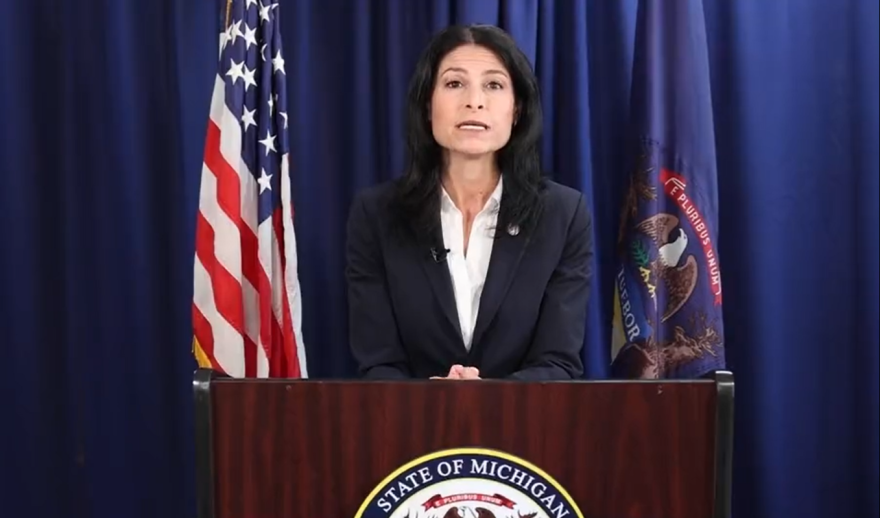Back in September 2024, Michigan Attorney General Dana Nessel charged 11 people connected with a pro-Palestinian encampment set up earlier that year at the University of Michigan. The tent encampment, which was organized by a coalition of pro-Palestinian student organizations, called for U-M to divest its endowment from companies that do business with Israel.
A month after it was set up, the encampment was dispersed by about 40 officers with pepper spray and batons. The U-M administration cited safety concerns in its reasoning to raid the encampment.
While protesters moved back, seven protesters allegedly defied these orders by obstructing a path between themselves and the police officers using chairs and pushing their bodies. Those seven were charged with trespassing, a misdemeanor, and resisting arrest, a felony.
Michigan Public reporter Beenish Ahmed has been watching the case closely. She joined Stateside to explain the details.
The case is still in the pretrial phase, with several moving parts that still need to be resolved before it could go to a jury. That includes a motion that the judge should bar Michigan Attorney General Dana Nessel from prosecuting the case and instead assign a special prosecutor.
The recusal request
In a case involving Hamtramck city council members accused of election fraud, Nessel made a recusal request and asked the judge to appoint a special prosecutor. Nessel’s office wrote that she had taken policy positions against members of the city council who voted to pass a resolution banning nongovernmental flags, including LGBTQ+ pride flags, from city property. She wanted to avoid “even the appearance of impropriety,” according to the recusal request.
In that same petition, she also acknowledged criticism she’s faced for her prosecution of the case against the protesters at U-M.
Now, defense attorneys Jamil Khuja and Amir Makled, who first filed the motion for recusal in the protesters' case, said that if there’s an appearance of impropriety in the Hamtramck case, it would apply to the case of the seven pro-Palestinian protesters too.
People v. Herrick, a Michigan Court of Appeals case, outlines two criteria for recusal: conflict of interest from an attorney-client relationship and situations where the “prosecutor has a personal, financial, or emotional interest in the litigation or with the accused.”
Anti-Arab bias allegations prompt criticism
Nessel has criticized U.S. Representative Rashida Tlaib (D-MI 12), the only Palestinian-American member of Congress, for her use of the rallying cry, “From the river to the sea, Palestine will be free.” In a press conference alongside State Senator Jeremy Moss (D-Southfield), Nessel called the phrase anti-Semitic. Both Moss and Nessel are Jewish.
The defense attorneys in the U-M protesters' case argue Nessel should recuse herself because her criticism of a slogan commonly heard at pro-Palestinian rallies leads to the perception of bias.
In court the attorney general's office said that Nessel does not harbor anti-Muslim or anti-Palestinian bias and was simply pointing to different interpretations of the phrase. “They say that the attorney general advocates for free speech and that she is invested in people exercising that right, but in this case people went beyond that right to break the law,” Ahmed said.
What’s unusual?
Defense attorneys for the protesters say the attorney general tends to handle complicated legal cases with serious charges and that it's rare for a state prosecutor to be in court arguing a case with low level charges like trespassing and resisting arrest.
The defense attorneys argued before the judge in a pretrial hearing that Nessel “cherry picked” these cases — and that she wanted them after the Washtenaw County prosecutor resolved other cases against protesters with diversion programs for young offenders and plea agreements that dropped charges to misdemeanors.
But Nessel’s office has defended her position, arguing that the alleged offenders are tied to crimes across multiple jurisdictions. Just last week, her office confirmed it had carried out search warrants and arrests in Ypsilanti, Ann Arbor, and Canton related to instances of vandalism that Nessel said are connected with pro-Palestinian demonstrators.
What’s next?
Washtenaw County Judge Cedric Simpson is in charge of the case. During the pretrial hearings, he repeatedly asked the attorney general's office to explain two things: how the attorney general came to take up the relatively minor cases, and why, if the attorney general believes she can be impartial in the protesters' case, she brought that case up in her recusal request in the Hamtramck election fraud case.
The decision on the motion for a recusal is expected May 5.
Editor's note: The University of Michigan holds Michigan Public's broadcast license.









